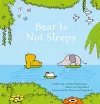
Bear Is Not Sleepy
Jelleke Rijken - Hardback
£12.99
Jelleke Rijken (1973, Wassenaar, the Netherlands) knew from a young age already she wanted to become a teacher. So she attended teacher’s training college and has been working at a school since 1996. She also runs a private practice to help children by way of meditation, coaching and massage. Jelleke has always been fond of books. As a child she would get lost in a story. She couldn’t stop reading and so she continued even when she should go to sleep, with a flashlight under her blanket. Her son Matthijs cannot read for himself yet, but every night his parents choose a book from the family bookshelves to read aloud for him. The questions the boy asks while listening are invitations for philosophical talks between child and parents. Jelleke is very keen on her book ‘Dag opa’ (‘Goodbye, grandpa’). When she was young, she lost her father. This experience made her write this book, hoping the subject of death can be discussed in an open and honest way by parents and children. Mack (1960, the Netherlands) is a graphic designer and illustrator from The Netherlands. He was educated at the Royal Academy of Art in The Hague. During his education he made funny and educational cartoons about, among others, penguins and whales. These cartoons were later bought by the ‘Diergaarde Blijdorp’-zoo in Rotterdam. By now Mack is a regular illustrator at this animal park and he is the author of several children’s books, in which animals often are the lead characters. Mack has a primitive way of drawing. He gets inspired by African art and the paintings of the Australian aboriginals. Both create an immense power by simplifying shapes. Mack wants to combine that powerful simplification with a subtle sense of humour. “In my books I try to teach children something in a funny way,” Mack says. “If I draw a penguin, it doesn’t matter to me that much how pretty he is or how good of an swimmer he is. What I want to show the most is how baggy he stands on the ice and how funny his walk is. That funny bagginess is what I try to catch in a couple of lines. Only when children can laugh about it, I think to myself: ‘Yes, I did it’.”